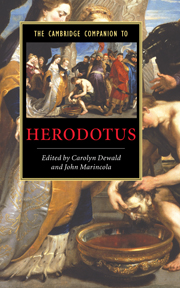Book contents
- Frontmatter
- Introduction
- 1 Herodotus and the poetry of the past
- 2 Herodotus and his prose predecessors
- 3 Herodotus and tragedy
- 4 The intellectual milieu of Herodotus
- 5 Meta-historiē: Method and genre in the Histories
- 6 The syntax of historiē: How Herodotus writes
- 7 Speech and narrative in the Histories
- 8 Herodotus, Sophocles and the woman who wanted her brother saved
- 9 Stories and storytelling in the Histories
- 10 Humour and danger in Herodotus
- 11 Location and dislocation in Herodotus
- 12 Herodotus and the natural world
- 13 Herodotus and Greek religion
- 14 Warfare in Herodotus
- 15 Herodotus, political history and political thought
- 16 Herodotus and the cities of mainland Greece
- 17 An alternate world: Herodotus and Italy
- 18 Herodotus and Persia
- 19 Herodotus and foreign lands
- 20 Herodotus' influence in antiquity
- Glossary
- Timeline
- Bibliography
- Index
- Series List
17 - An alternate world: Herodotus and Italy
Published online by Cambridge University Press: 28 January 2007
- Frontmatter
- Introduction
- 1 Herodotus and the poetry of the past
- 2 Herodotus and his prose predecessors
- 3 Herodotus and tragedy
- 4 The intellectual milieu of Herodotus
- 5 Meta-historiē: Method and genre in the Histories
- 6 The syntax of historiē: How Herodotus writes
- 7 Speech and narrative in the Histories
- 8 Herodotus, Sophocles and the woman who wanted her brother saved
- 9 Stories and storytelling in the Histories
- 10 Humour and danger in Herodotus
- 11 Location and dislocation in Herodotus
- 12 Herodotus and the natural world
- 13 Herodotus and Greek religion
- 14 Warfare in Herodotus
- 15 Herodotus, political history and political thought
- 16 Herodotus and the cities of mainland Greece
- 17 An alternate world: Herodotus and Italy
- 18 Herodotus and Persia
- 19 Herodotus and foreign lands
- 20 Herodotus' influence in antiquity
- Glossary
- Timeline
- Bibliography
- Index
- Series List
Summary
Herodotus of Thurii
According to Aristotle, the first sentence of the Histories introduced it as the work 'of Herodotus of Thurii'. Thurii was a panhellenic colony founded during Herodotus' lifetime (probably 444/443 BCE) under the guidance of Athens, initially by invitation of the Sybarites, on the site of the former Achaean city of Sybaris. It represented, to a great extent, a brilliant communal experiment. After the departure of the old Sybarites, the colony became, or at least strove to be, a polis for all Greeks, internally mixed, egalitarian and democratic. If Aristotle is correct, Herodotus' identification with this project at the beginning of his work carries certain ideological consequences.
On the eve of the battle of Salamis, Themistocles declares to the uncooperative Greek allies that the Athenians might leave their home and move to Siris (8.62.2). If 'Herodotus of Thurii' is the first Italian reference in the work, Themistocles' threat is the last. In both passages, implicitly or explicitly, Italy is a place where one starts a new life. By travelling the distance between the one and the other, we will begin to derive from the scattered evidence in the Histories Herodotus' unified vision of the Italian West.
- Type
- Chapter
- Information
- The Cambridge Companion to Herodotus , pp. 257 - 273Publisher: Cambridge University PressPrint publication year: 2006
- 18
- Cited by

